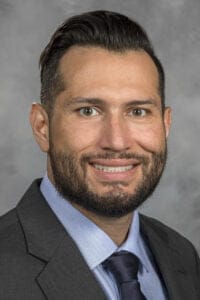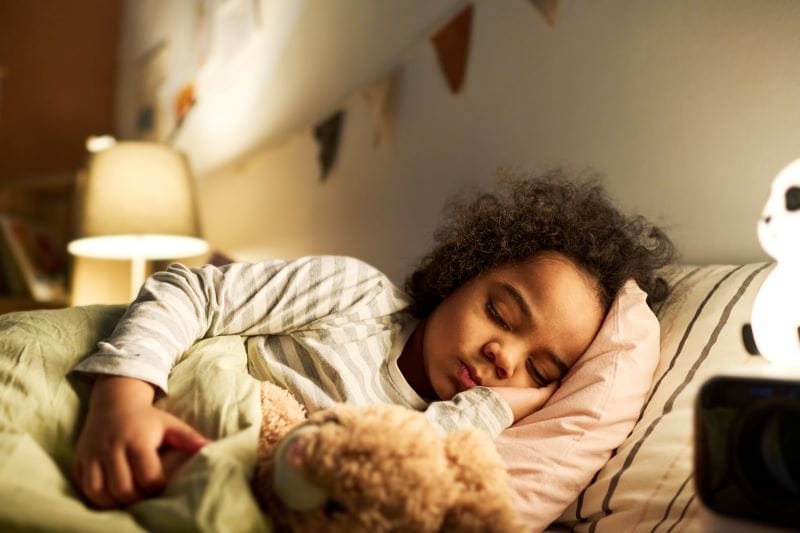The Top 5 Sleep Disorders in Kids
March is Sleep Awareness Month, which raises awareness for sleep disorders in kids. It may just be the occasional nightmare that wakes them up, but behavioral issues could also be to blame, like having them go to sleep at a reasonable hour.
Many of these will resolve on their own as children grow up, but more serious sleep disorders may be hard for parents to recognize. If left untreated, these can impact a child’s long-term health and quality of life.
Below are some of the most common pediatric sleep conditions treated at the Johns Hopkins All Children’s Hospital Sleep Center.
1. Sleep Walking and Sleep Talking (Parasomnias)
Sleepwalking, sleep talking and night terrors are called parasomnias. One part of the brain is aroused (“awake”) while other parts of the brain are still asleep. Causes can include genetic factors, insufficient sleep, obstructive sleep apnea or physical or emotional stress. However, travel, sleeping in an unfamiliar setting or environmental factors can also be triggers.
Parasomnias are not necessarily dangerous events and can occur in normally developing and healthy children. Treatment includes maintaining a safe sleep environment and addressing potential causes.
2. Obstructive Sleep Apnea
Muscles in your upper airway relax when you sleep. This relaxation, combined with possible enlarged structures in the upper airway, may end up blocking the airway closed resulting in obstructive sleep apnea. This can cut off oxygen supply, causing many wake-ups throughout the night.
It has been associated with behavioral and mood problems, fatigue and attention/concentration difficulties similar to ADHD. If left untreated, it can lead to high blood pressure, heart disease and even a stroke later in life.
In many children, the removal of tonsils and adenoids is an effective treatment. In other cases, a breathing device called a continuous positive airway pressure (CPAP) machine to keep the upper airways open will help patients.
3. Narcolepsy
Narcolepsy is a disorder where the part of your brain in charge of helping you regulate your activity and sleep balance is not working. Many patients with this disorder may wake up feeling rested great, but after a few hours, it may feel like they have not slept in days.
This can cause excessive daytime sleepiness, impact participation in school activities and lead to suffering grades. The most effective treatment is medication.
4. Restless Legs Syndrome
Restless legs syndrome is a disorder in which patients complain of a strong urge to move their limbs. It typically occurs when at rest and predominantly in the evening.
This sensation is often hard to describe, but words such as tingling, burning, itching, tickling or throbbing have been used. This can make it difficult to fall asleep and stay asleep. Movement improves the sensation, but begins again once you stay still.
Typically this can be managed with just a few lifestyle changes, but more severe symptoms may call for medication.
5. Insomnia
Insomnia is difficulty falling asleep or staying asleep and is a common complaint that most people experience in their lives. Stress, both physical and psychologic, are typical causes.
In younger children, certain routines like sleeping with a parent or having a bottle at bedtime can cause issues at bedtime when parents try to change this. Older children and teens might have behavioral factors such as going to bed and waking up at different times each day, disrupting the body's natural sleep-wake cycle.
The best treatment for Insomnia is a regular bed routine and limited stimulation before bedtime. Severe insomnia can be treated with cognitive behavioral therapy for insomnia (CBT-I) which does not involve medications.
Visit the Johns Hopkins All Children’s Sleep Center page for more information.
 Dr. Ortiz is a physician in the Sleep Center at Johns Hopkins All Children’s Hospital. He joined the medical staff in 2018. He sees patients at the main campus in St. Petersburg, Florida, as well as at Johns Hopkins All Children’s Outpatient Care, East Lake.
Dr. Ortiz is a physician in the Sleep Center at Johns Hopkins All Children’s Hospital. He joined the medical staff in 2018. He sees patients at the main campus in St. Petersburg, Florida, as well as at Johns Hopkins All Children’s Outpatient Care, East Lake.
Dr. Ortiz earned his medical degree from the University of Rochester. He completed his residency in internal medicine and pediatrics at the Charleston Area Medical Center, plus a fellowship in pediatric pulmonology at the Johns Hopkins University School of Medicine in Baltimore, Maryland. He also completed a fellowship in sleep medicine at the Children’s Hospital of Philadelphia and the Hospital of the University of Pennsylvania in Philadelphia.
His clinical interests include narcolepsy, hypersomnia, obstructive sleep apnea, and skeletal dysplasias. His research interests include examining the interaction of sleep disorders on chronic pediatric diseases such bronchopulmonary dysphasia, asthma and developmental delay. He has worked extensively in creating educational content for people with narcolepsy as well as advocating for patients with rare diseases.
*Presented by Johns Hopkins All Children's Hospital


